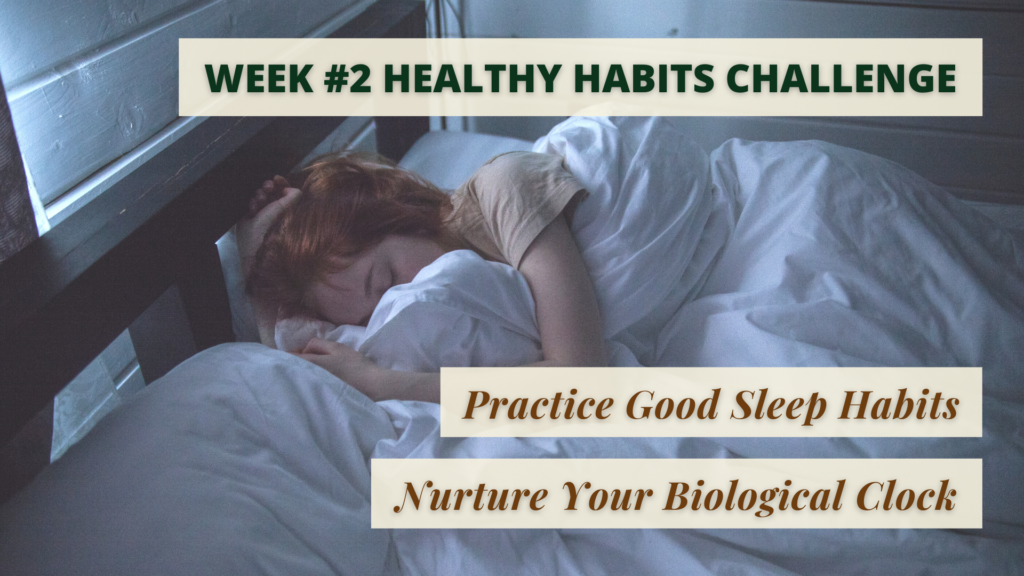Join our mailing list to receive the latest health tips and updates.
You have Successfully Subscribed!
Week #2 Healthy Habits Challenge – Practice Good Sleep Habits, Nurture Your Biological Clock

Welcome to Week #2 of the 12-Week Healthy Habits Challenge!
Sleep is an important aspect of healthy living and yet it is often among the first few things we deprioritize amidst our busy life.
The importance of sufficient and good quality sleep to our health and well-being is often overlooked.
It is also important to honor the body’s 24-hour internal biological clock, called the circadian rhythm, by aligning our wake-sleep schedule to the natural light-dark conditions.
This ensures adequate production of melatonin (the sleep hormone) which is among the most potent antioxidants in the body, helps to combat aging and has protective effects on gut, liver, kidney and brain health.
Do you know that chronic sleep deprivation, poor sleep quality and disruption of the circadian rhythm can be major culprits to many chronic diseases/health conditions so prevalent in our modern society?
These include overweight and obesity, diabetes, hypertension, high cholesterol, cardiovascular/heart disease, poor immune health and chronic inflammation, hormonal imbalance, cancers, gut disorders/diseases, liver disease, cognitive function and memory impairment, Alzheimer’s disease and dementia, and poor mental health, etc.
Tips for Better Sleep, Better Health
Here are some tips you can incorporate to support a better sleep and nurture your body’s biological clock:
- Maintain a regular sleep schedule, by sleeping no later than 10-11pm and for 7-8 hours each night.
- Minimize or reduce exposure to artificial light, especially blue light from devices and electrical lighting, by dimming light in the house and minimizing screen time in the evening.
- Establish a bedroom environment that is conducive to sleep, including sleep in a pitch-dark and quiet room, with comfortable bedding, etc.
- Eat the last meal of the day at least 3 hours before bedtime to allow active digestion to be completed before bedtime.
- Avoid caffeinated drinks or foods in late afternoon and evening.
- Avoid alcohol before bedtime.
- Avoid tobacco or nicotine containing products.
- Unwind and prepare the body to be in resting and parasympathetic mode 2-3 hours before bedtime, by avoiding moderate-to-high intensity physical activities and mentally/emotionally stressful activities, and engaging in relaxation activities (e.g., taking warm bath, listening to relaxation music, gentle yoga or stretching, meditation, etc.).
- Perform regular physical exercise during the day to help regulate circadian rhythm. Moderate-to-high intensity exercise should be performed during early part of the day.
For more details, full list of tips and the relevant scientific references, please check out my previous articles on sleep and melatonin:
- Tips for Better Sleep to Support Your Immune Health and Overall Health
- Melatonin – Not Just Your Sleep Hormone
- Rest, Relax and Nurture Your Biological Clock This Holiday Season
Join me for this Week #2 challenge and practice good sleep habits for your well-being!
Related Articles
Tips for Better Sleep to Support Your Immune Health and Overall Health
Melatonin – Not Just Your Sleep Hormone
Rest, Relax and Nurture Your Biological Clock This Holiday Season
